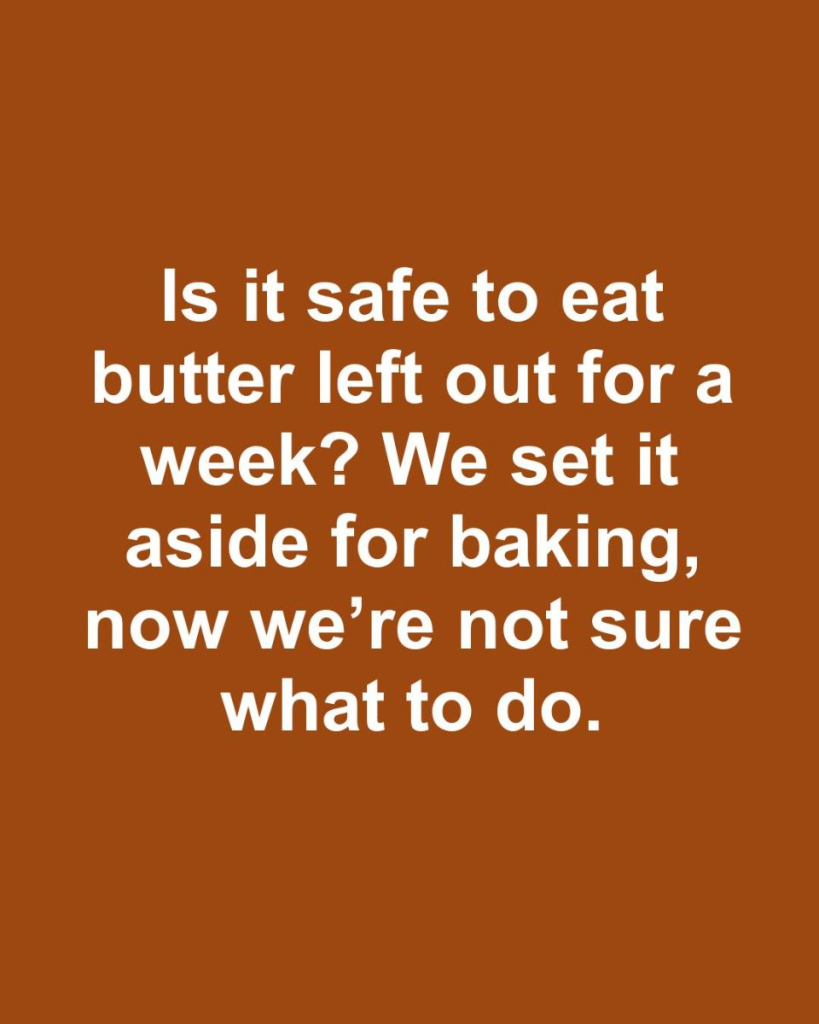Let’s start with the basics: butter is mostly fat. To be specific, it’s about 80% fat, with the rest being water and milk solids. This high fat content gives butter a bit of an edge compared to other dairy products—it doesn’t spoil as quickly. That’s why some folks confidently leave it in a butter dish on the counter for days.
But here’s the catch: while it may survive for a little while at room temp, it’s not invincible. Butter is still a dairy product, and eventually, the elements will catch up with it.

What Actually Makes Butter Go Bad?
Think of butter like a sponge for flavor—and not always the good kind. Over time, a few things can mess it up:
- Bacteria: While salted butter has some defense because of the salt, unsalted butter is fair game for microbial growth.
- Mold: It loves moisture, and butter has just enough water content to attract spores.
- Oxygen: When butter’s exposed to air for too long, the fats start to break down in a process called oxidation. That’s what gives you rancid butter—that funky, off-putting smell and taste.
- Light and Heat: These speed up oxidation and bacterial activity, especially if you’ve got your butter dish sitting near the stove or a sunny window.
Video: How to Store Butter at Room Temperature
How Long Can Butter Really Sit Out?
So how long is too long? Well, it depends.
- Salted butter: This type is a bit tougher. In a cool kitchen (below 70°F or 21°C), it can stay out for a couple of days without much trouble.
- Unsalted butter: More delicate. This version should probably head back into the fridge within a day or two max.
- Climate matters: If you’re living somewhere hot and humid? Butter won’t last long at all—maybe a day before it starts going downhill.
- Storage: Was the butter left uncovered? Did you keep it in a butter bell or crock? These details matter. An airtight container can make a huge difference.
So… What Happens If You Eat Butter Left Out for a Week?
Here’s where it gets dicey.

- If it’s rancid: It might not make you sick, but it’ll definitely ruin the flavor of your cookies or cakes. That sharp, sour taste? Yeah, not what your banana bread needs.
- If it has bacteria or mold: Now we’re talking real food safety risks. Think potential stomach upset, food poisoning, or worse—especially for kids, seniors, or anyone with a weaker immune system.
And remember, you can’t always see or smell the danger. Mold can grow invisibly beneath the surface. Just because it looks okay doesn’t mean it’s safe.
What the Experts Say About Butter Safety
Most food safety experts agree on this: butter should live in the fridge.
Video: Can You Leave Your Butter On The Counter?
Yes, it’s okay to leave out a small amount for easier spreading—but only for a couple of days, and only if your kitchen stays cool and the butter is kept covered.
A whole week on the counter? That’s a no-go, especially if the butter smells weird, tastes off, or shows signs of mold.
Tips to Keep Your Butter Fresh Without Sacrificing Convenience
If you love soft, spreadable butter (and who doesn’t?), there are some tricks you can use without risking your health:
- Use a butter crock: These clever little pots keep butter fresh at room temperature using a water seal that blocks air.
- Keep small batches out: Instead of risking a whole stick, just cut off what you’ll use in the next day or two and store the rest in the fridge.
- Cover it up: Always, always cover your butter. Air is not your friend here.
What to Do If Your Butter’s Been Left Out Too Long

If your butter’s been sitting out for a week, you have two choices:
- Toss it: If you’re unsure, don’t gamble. Baking with spoiled butter will wreck your recipe and could mess with your stomach.
- Use a substitute: Fresh butter is best, of course, but you can also use:
- Margarine
- Ghee (clarified butter, which is shelf-stable)
- Coconut oil or other plant-based spreads (depending on your recipe)
These stand-ins can save the day, especially if you’re mid-baking and don’t want to make a grocery run.
Final Thoughts: Better Safe Than Sorry
Butter might seem like a tough ingredient, but it’s not indestructible. Leaving it out for a few hours? Totally fine. A few days? Risky. A whole week? Probably not worth the gamble.
Next time you bake, take a quick sniff and look before tossing that butter into your mixing bowl. If it’s questionable, toss it. There’s no sense ruining your cake—or your stomach—over a stick of butter.


